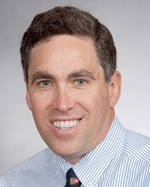December 2013

Jess Mandel, MD
From the vantage point as associate dean for undergraduate medical education and professor of clinical medicine at the University of California, San Diego, Jess Mandel, MD, is able to monitor the pipeline of burgeoning medical professionals in real time.
“Medical students are pluripotent,” Dr. Mandel says. “Their interests tend to be broad, and there’s a level of intellectual curiosity that is fun to work with. Our goal is to help students identify their professional goals.”
Fortunately, Dr. Mandel has also seen a renewed interest in pulmonary and critical care medicine as well as a growing interest in sleep medicine. “The draws are the same for current students as they were for faculty when we were students years ago—the fast pace, high stakes nature of critical care medicine is exciting.”
Having dedicated his career to academic medicine, Dr. Mandel has gradually become an in-demand curricular architect, helping to revise UCSD’s entire medical school curriculum after joining that institution in 2006. He’s also serving as the co-investigator of a large National Institutes of Health grant to expand the medical education program at the Universidade Eduardo Mondlane, the oldest and largest university in Mozambique. Previously, he helped shape medical education at the University of Iowa as the assistant dean for student affairs and curriculum and helped in the creation of UpToDate, a clinical decision-support system.
Dr. Mandel earned his medical degree in 1991 from Baylor College of Medicine, and completed his internship, residency, and fellowship in 1998 at the Beth Israel Deaconess Medical Center, where he had also served as chief medical resident. His aptitude for medical education stewardship was recognized early on by his mentors, who include ATS President Patricia W. Finn, MD, says Steven Weinberger, MD, executive vice president and CEO of the American College of Physicians, and Richard M. Schwartzstein, MD, associate chief of pulmonary and critical care medicine at Beth Israel and vice president of education.
“I knew that Jess would have a sterling career ahead of him as an outstanding clinician, an inspiring teacher, and a highly successful and innovative educational leader,” says Dr. Weinberger, whose example led Dr. Mandel to pursue respiratory medicine at Beth Israel and become active in the ATS. The two also collaborated with Barbara A. Cockrill, MD, on the Saunders/Elsevier textbook Principles of Pulmonary Medicine (fifth edition). “He embodies all the desired attributes of the best medical educators: a brilliant and creative mind, clarity of speaking and writing, wonderful listening skills, and warmth and empathy toward learners at all stages.”
Dr. Schwartzstein adds: “Jess possesses an amazing sense of calm and equanimity that one finds only in the best doctors and teachers. He is always true to his principles and high standards, and his students and trainees respond with their best work because his dedication to them and their learning shines through in everything he does. He would be a great person with whom to share a lifeboat stranded at sea; he always sees the bright side of any situation.”
Pulmonary vascular disease has been Dr. Mandel’s clinical and scholarly interest since fellowship, and he’s helped to establish programs at Beth Israel Deaconess, the University of Iowa, and UCSD, where he spends a half-day every week in the PH clinic and another 6 to 12 weeks a year in the MICU. He’s written several articles as well as the Mosby/Elsevier textbook Pulmonary Vascular Disease. “Certainly, at USCD we have an amazing pulmonary vascular group, both in terms of small vessel disease and chronic thromboembolic disease,” Dr. Mandel notes.
While he’s ascended through the ranks in education administration, he’s always felt that his primary identity is as a pulmonologist, and he keeps a relaxed attitude toward titles. “I feel like being a dean is like being a baseball manager: one should expect that to be a temporary affiliation and that, at some point, the institution needs to keep those positions fresh and rotate people in and out,” Dr. Mandel says. “Practicing pulmonary and critical care medicine is something that I love, and there are certainly times when I wish was doing even more of it.”
And back at UCSD, he gets to see medical students begin to develop the same passion. “Students tell me that the level of teaching from pulmonary and critical care faculty is among the best they encounter in medical school.”
Life in ATS
ATS Member Since: 1995
Primary Assembly: Pulmonary Circulation
Secondary Assemblies: Clinical Problems, Behavioral Science and Health Services Research
Dr. Mandel serves as editor of the Expert Clinician section in the Annals of the American Thoracic Society and as vice chair of the Planning and Evaluation Committee. He previously served in the Education Committee, and in 2010, he won the American Thoracic Society Clinical Problems Assembly National Clinician Educator Award.
“As you get involved, you realize that the entire organization is entirely dependent on people getting involved,” Dr. Mandel says. “One of the things we can do better at ATS is make that handoff clear. We shouldn’t have people assuming there’s no place for them. I think about when I lived in Iowa City. If your child was in the Cub Scouts, it was clear that you were going to be involved in running the organization. My feeling is that the ATS should be the same way.”
Jess would be a great person with whom to share a lifeboat stranded at sea; he always sees the bright side of any situation.Richard M. Schwartzstein, MD

